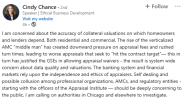Problems are piling up at the Chicago-based Appraisal Institute, an influential group in the real estate industry because of its key role in property valuation.
They include a sexual harassment lawsuit filed by a former CEO, a lengthy investigation published by The New York Times and, according to the ex-CEO, entrenched business practices that allegedly undermine the integrity of appraisals done for homes and commercial property.
"Appraisers are supposed to have a special role in the real estate system," said Cindy Chance, who from September 2023 to September 2024 was the CEO of the 16,000-member group headquartered on Madison Street in the Loop. "They’re supposed to have the independence to collect information and make a professional judgment about the value of a property irrespective of what the lender or the homeowner or the real estate agent wants the value to be."
Because of what she alleges is entrenched "self-dealing and corruption" at the Appraisal Institute, Chance said, "There's not the security in our mortgage system that is necessary." That is, buyers of homes and commercial property may be receiving an estimate of value that is flawed, she told Crain's in an interview today.
Chance's allegations about the organization's practices are contained in a lawsuit filed May 8 in Cook County Circuit Court that also includes claims of sexual harassment against the board's current vice president and past president, Craig Steinley.
(Read the complaint below.)
Chance said in her interview with Crain's she was told by institute officials that she was being brought in to "ensure that they made the changes needed to have that security" in the real estate valuation system, but she soon came to believe "that was all window dressing. They didn't want any change in their culture."
The former CEO told Crain's she believes the threat to a clear, unencumbered valuation process is so great that she wants the Illinois attorney general's office to investigate the group's practices.
Chance's allegations come on the heels of a lawsuit filed in March by the institute's former director of education and publications — someone hired by Chance during her tenure — that
alleges the Appraisal Institute knowingly and fraudulently provided false scores on test results in the real estate appraiser certification process.
The claims from Chance and the former education director, Alissa Akins, aim at the core of the Appraisal Institute's mission, which
it describes on its website as serving as "the go-to resource for the valuation profession" and "the gold standard in credentialing."
The Appraisal Institute's communications director, Bill Garber, responded to Crain's request for comment with a reiteration of
a statement posted at the top of its website by its president, Paula Konikoff, that says: "The leadership and staff are fully committed to the highest ethical and professional standards—that is core to who we are and how we work every day."
Konikoff, a Los Angeles-based author on appraisals, wasn't immediately available to comment. Steinley, who heads an appraisal firm in Rapid City, S.D., did not immediately respond to a request for comment.
Steinley was the subject of a
May 8 New York Times story where reporter Debra Kamin laid out claims of alleged sexual misconduct toward at least seven women over a 10-year period, including groping of buttocks and sexually suggestive, too-long hugs. Steinley told the Times he denied the claims.
Five days after the story appeared, Konikoff
posted on LinkedIn that Steinley "has decided to step away from his public AI officer appearances, effective immediately. He said he makes this choice out of consideration for and in the interest of not being a distraction to the important and ongoing work of the organization and will cooperate with any investigatory effort." On this topic, too, the Appraisal Institute's Garber replied to Crain's by reiterating this statement.
The Times' description of the Appraisal Institute condoning an "old boys" culture echoes the portrait Kamin painted of another Chicago-based real estate group, the National Association of Realtors, in August 2023. It was followed by two successive presidents resigning and the CEO retiring early and being replaced with a new one charged with
righting the ship. The Appraisal Institute is in part an outgrowth of NAR, although from decades ago.
Both Steinley and the Appraisal Institute are defendants in the lawsuit Chance filed earlier this month, which alleges he sexually harassed her and undercut her authority as CEO and that institute officials steadfastly protected business practices that harm consumers. Chance is represented by Anita Mazumdar Chambers of the Employment Law Group in Washington and Thalia Pacheco of Workplace Law Partners in Chicago.
The alleged harm, which the complaint mentions and Chance spoke about with Crain's, lies in the growing role of appraisal management companies at the institute, a relationship she told Crain's "is not for consumers' benefit."
An outgrowth of the housing crisis of the early 2000s, appraisal management companies, or AMCs, are there to provide a buffer between a mortgage lender and an appraiser, to reduce lenders' ability to pressure appraisers to come up with valuations that artificially support a mortgage value.
But Chance
wrote in a post on the organization's website in 2024 that "AMCs have created a race to the bottom in terms of fees paid to professionals and time spent on appraisals. Why? Because there was money to be made in being in the middle and there was nothing to stop AMCs from raising their fees while they reduced the fees they paid to appraisers. The public is not aware of this because AMCs do not need to disclose their fees—something the Appraisal Institute has long supported. The regulatory oversight of AMCs appears inconsistent and lacking in protections for the consumer."
This, Chance told Crain's today, is a larger issue than her sexual harassment case. The dispute between her and the institute, she said, "isn't a story about sexual harassment, it's a story about the security of our mortgage system, the biggest wealth creator that individuals have, and whether the valuations they're relying on are done by the best professionals." The existing structure, she believes, "is too insular. It's so important that an independent valuation reflects real value in the marketplace."
A former executive with the Urban Land Institute, Chance started work as the Appraisal Institute's CEO in September 2023, moving from Washington, D.C., to an apartment on North Michigan Avenue. A big part of her charge, she said today, was reworking the group's training programs, which studies had found to
perpetuate racial bias in appraised home values, because appraisers traditionally picked their own trainees, informally passing along inequitable standards for valuation.






